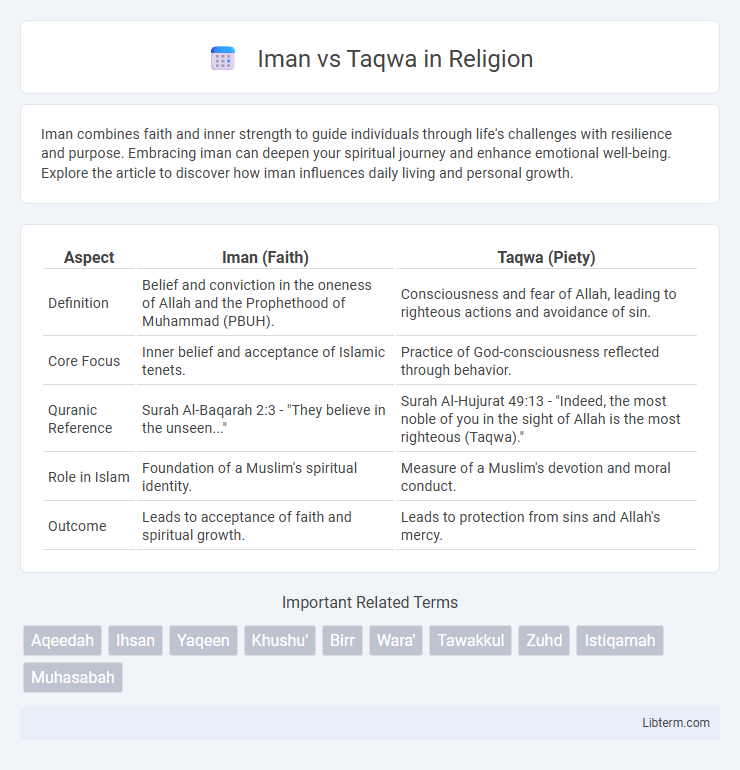Iman combines faith and inner strength to guide individuals through life's challenges with resilience and purpose. Embracing iman can deepen your spiritual journey and enhance emotional well-being. Explore the article to discover how iman influences daily living and personal growth.
Table of Comparison
| Aspect | Iman (Faith) | Taqwa (Piety) |
|---|---|---|
| Definition | Belief and conviction in the oneness of Allah and the Prophethood of Muhammad (PBUH). | Consciousness and fear of Allah, leading to righteous actions and avoidance of sin. |
| Core Focus | Inner belief and acceptance of Islamic tenets. | Practice of God-consciousness reflected through behavior. |
| Quranic Reference | Surah Al-Baqarah 2:3 - "They believe in the unseen..." | Surah Al-Hujurat 49:13 - "Indeed, the most noble of you in the sight of Allah is the most righteous (Taqwa)." |
| Role in Islam | Foundation of a Muslim's spiritual identity. | Measure of a Muslim's devotion and moral conduct. |
| Outcome | Leads to acceptance of faith and spiritual growth. | Leads to protection from sins and Allah's mercy. |
Understanding Iman: The Foundation of Faith
Iman, as the foundation of faith in Islam, refers to the deep-rooted belief in Allah, His angels, His revealed books, the prophets, the Day of Judgment, and divine predestination. It constitutes the spiritual conviction that shapes a Muslim's identity and worldview, differentiating from taqwa, which emphasizes God-consciousness and piety manifested through actions. Understanding iman is crucial for grasping the essence of Islamic spirituality, as it establishes the inner certainty upon which all religious practices and moral responsibilities are built.
Defining Taqwa: Consciousness of Allah
Taqwa is a profound spiritual consciousness of Allah that guides a believer's actions and intentions toward righteousness and piety. It encompasses fear, love, and mindfulness of God's presence, fostering a vigilant heart that avoids sin and seeks divine pleasure. Rooted in Quranic teachings, taqwa represents an elevated state of faith (iman) manifesting through ethical behavior and unwavering devotion.
Core Differences Between Iman and Taqwa
Iman refers to faith or belief in the fundamental tenets of Islam, including the oneness of Allah, prophets, and the afterlife, forming the foundation of a Muslim's spiritual identity. Taqwa signifies God-consciousness or piety, emphasizing mindfulness of Allah in actions, intentions, and avoidance of sin to attain righteousness. The core difference lies in Iman as the inward belief system, while Taqwa represents the outward manifestation of that belief through ethical conduct and spiritual vigilance.
The Role of Iman in a Muslim’s Life
Iman, or faith, forms the foundation of a Muslim's spiritual identity, shaping beliefs and guiding actions in accordance with the teachings of Islam. It fosters a deep sense of trust in Allah's wisdom, influencing moral choices and motivating sincere worship, which distinguishes a true believer from mere outward conformity. While taqwa, or God-consciousness, represents the practical manifestation of iman through mindfulness and righteousness, iman is the intrinsic conviction that underpins a Muslim's relationship with Allah and commitment to the Islamic way of life.
How Taqwa Shapes Daily Actions
Taqwa, defined as God-consciousness and fear of Allah, actively influences daily behavior by encouraging ethical decision-making and consistent adherence to Islamic principles in all aspects of life. Unlike Iman, which is the foundation of faith, Taqwa translates belief into tangible actions such as honesty, patience, and charity, fostering spiritual growth and social responsibility. This mindfulness of divine presence ensures that everyday choices align with moral integrity and accountability as emphasized in the Quran and Hadith.
Quranic Perspectives on Iman and Taqwa
The Quran emphasizes Iman as the foundation of faith, highlighting belief in Allah, His angels, prophets, scriptures, and the Day of Judgment (Surah Al-Baqarah 2:177). Taqwa is presented as God-consciousness and piety, encouraging believers to avoid sin and act righteously in accordance with divine guidance (Surah Al-Hujurat 49:13). Together, Iman and Taqwa are essential for spiritual success, with Taqwa serving as the practical manifestation of one's faith through obedience and mindfulness of Allah.
Strengthening Iman: Practical Steps
Strengthening iman requires consistent engagement in daily prayers, recitation of the Quran, and mindful remembrance of Allah (dhikr) to deepen spiritual connection. Practicing taqwa through conscious avoidance of sinful behavior and sincere repentance reinforces iman by fostering a heart aligned with divine guidance. Regular participation in Islamic community activities and seeking knowledge from authentic sources cultivates resilience and growth in faith.
Nurturing Taqwa: Habits for Mindfulness
Nurturing Taqwa involves cultivating mindfulness through consistent reflection on one's thoughts, actions, and intentions in alignment with Islamic principles. Establishing daily habits such as regular prayer, sincere repentance, and mindful remembrance (dhikr) strengthens awareness of Allah's presence. These practices foster a deep-rooted consciousness that guides ethical decision-making and spiritual growth.
The Interconnection Between Iman and Taqwa
Iman, representing faith in Allah and His attributes, serves as the foundational belief essential for spiritual growth, while Taqwa embodies the consciousness and fear of Allah expressed through righteous actions and avoidance of sin. The interconnection between Iman and Taqwa is intrinsic, as true Iman inherently leads to the development of Taqwa, and heightened Taqwa reinforces and strengthens one's Iman. Quranic verses, such as Surah Al-Baqarah 2:2, emphasize that those who possess both Iman and Taqwa are the most guided and successful in both this world and the Hereafter.
Benefits of Balancing Iman and Taqwa
Balancing Iman (faith) and Taqwa (God-consciousness) enhances spiritual growth by integrating belief with conscious ethical behavior, leading to inner peace and resilience. This harmony fosters stronger personal discipline and social responsibility, promoting a balanced life aligned with Islamic principles. Emphasizing both ensures comprehensive development, cultivating a meaningful connection with Allah and practical adherence to His guidance.
Iman Infographic

 libterm.com
libterm.com